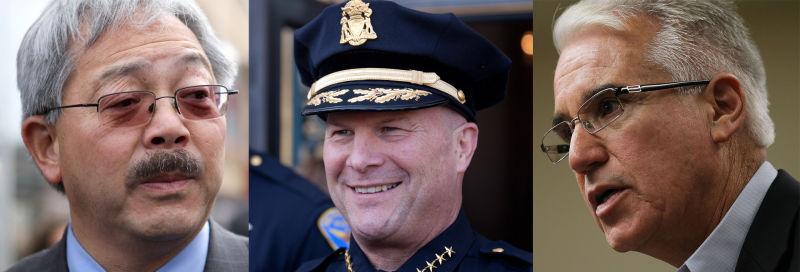"This is not the type of transparency and collaboration we would expect from a department and a chief eager to improve," he wrote.
Mayor Lee's office did not respond to requests for comment on Gascón's letter.
The POA sent a bulletin to members last month saying that it "rejects [the] premise" of the blue-ribbon panel and urging any officer contacted to inform the union.
POA President Martin Halloran said previously that the panel has no authority to investigate individual officers or "to go on a witch hunt of my members," though he acknowledged no such request had been made. He said the union asked to handle officer interview requests "as a courtesy," and that in general the POA is not against officers being interviewed as subject matter experts.
But Halloran took issue with testimony from one current officer who has already talked to the panel.
Sgt. Yulanda Williams, the head of a minority SFPD group called Officers for Justice and a subject of some of the racist text messages uncovered last year, appeared before the panel earlier this month to testify on Police Department culture. She criticized both the department and the POA for what she called "disregard" of black officers and minority communities in the city.
Last week, Halloran sent Williams a letter challenging her statements.
"The POA is disturbed about some of your comments and accusations," Halloran wrote. "For example, you claim that racism is 'widespread' within our department. The POA disagrees. While a handful of officers engaged in racist and homophobic text messaging -- and were condemned for doing so by the POA and by me personally -- there is no evidence that racism is widespread throughout the department."
Jerome Roth, an attorney serving as the panel's general counsel, sent the department a broad public records request Dec. 16 seeking documents from 30 categories, including officer discipline records, arrest statistics, department policies and an accounting of the department's internal affairs investigation into the texting scandal. A Superior Court judge blocked any discipline for nine officers implicated in the scandal last month, ruling the department waited too long to investigate the case.
The Police Department has not responded to questions about its cooperation with the panel, nor to a KQED request for documents and correspondence related to the panel's public records request.
Roth filed a complaint with the city's Sunshine Ordinance Task Force Jan. 12 asking the oversight body to compel the department to produce the requested documents.
Roth wrote that the department responded to just seven of 30 records requests from the panel. And in three of those seven cases, Roth said, the department withheld the requested documents, citing various provisions of state law.
"The SFPD did not explain why these prohibitions apply or why, per department policy [and city law] such records could not be redacted," Roth wrote.
The department has not updated its response, panel executive director Anand Subramanian said in an email Friday.
He said the POA had provided a list of names "they consider relevant" and insisted that any interviews of those SFPD officers take place at the union's offices with POA attorneys present.
"The law firm working groups are moving forward with these interviews, despite these constraints," Subramanian wrote. "We are also working to set up an interview with POA leadership."
Suhr sent Subramanian a letter Jan. 20 in response to a request for his interview, scheduling a one-hour session for Feb. 2. He also wrote that "all requests on behalf of the Panel should go through the appropriate labor group or association representing an active employee," and that "any member of the department who chooses to appear before the Panel would do so voluntarily, on their own time."
Suhr also noted that as of Jan. 25, the department was participating in a voluntary policy review through the U.S. Department of Justice Office of Community Oriented Policing Services. A former federal prosecutor with knowledge of the Justice Department's "Collaborative Reform" process said it is similar to "pattern or practice" investigation like those underway in Chicago and Baltimore. However, the process is not as thorough and does not include the threat of federal prosecution.
Gascón noted in his letter to Lee that San Francisco ranked eighth in police killings among the 60 largest cities in the U.S. in 2015, and that the Police Department saw a 50 percent increase in officer-involved shootings last year.
